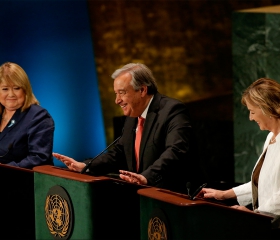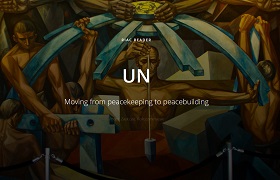It is safe to assume that António Guterres, who assumed the office of the UN Secretary-General on January 1, 2017, will be able to bring positive momentum to the activities of the global organization. One can say this because during his ten-year tenure as the UN High Commissioner for Refugees (2005–2015), he was extremely successful in cutting down the excessive bureaucracy at the agency he fronted in Geneva. Guterres visited conflict zones, which inspired his staff members to venture out of their cosy offices and work “in the field,” as their mandate indeed requires. This approach is also strikingly different from that of Guterres’ predecessor, Ban Ki-Moon, who, as we know, refrained from participating personally in conflict resolution.
It is safe to assume that António Guterres, who assumed the office of the UN Secretary-General on January 1, 2017, will be able to bring positive momentum to the activities of the global organization. One can say this because during his ten-year tenure as the UN High Commissioner for Refugees (2005–2015), he was extremely successful in cutting down the excessive bureaucracy at the agency he fronted in Geneva. Guterres visited conflict zones, which inspired his staff members to venture out of their cosy offices and work “in the field,” as their mandate indeed requires. This approach is also strikingly different from that of Guterres’ predecessor, Ban Ki-Moon, who, as we know, refrained from participating personally in conflict resolution.
The UN Charter stipulates that the serving as the chief administrative officer, Secretary-General shall ensure the functioning of the organization and that he “may bring to the attention of the Security Council any matter which in his opinion may threaten the maintenance of international peace and security.” In that regard, much depends on Guterres and how effective he will be in keeping the promises he made during his electoral campaign. In this respect, words regarding the desire to act as an intermediary with the aim of bringing the positions of Russia and the United Nations closer together to solve the Syrian crisis were particularly encouraging.
Naturally, in such a complex issue, Guterres is relying on the position of the U.S. President Donald Trump, who, during his election campaign, supported Russia’s actions against Islamic State in Syria.
The Syrian crisis will likely force Guterres to “restore order” in the United Nations itself, so that its highest officers involved in the resolution of the Syrian crisis will not make diametrically opposed statements. Suffice it to recall one tell-tale example. On October 6, the UN Special Envoy for Syria, Staffan de Mistura, addressed the fighters of the Al-Nusra Front terrorist group, appealing to them to not keep 275,000 civilians and children hostage and to leave Aleppo with their weapons. Meanwhile, his colleague Stephen O’Brien, Under-Secretary-General for Humanitarian Affairs and Emergency Relief Coordinator, previously described the fighters’ voluntary departure as “mass civilian evacuations” and condemned this practice by calling it a “forced displacement.”
The newly elected Secretary-General announced that he was ready to take the resolution of urgent issues on the UN agenda to a new level, such as: reforming the organization’s working methods, including eliminating bureaucracy and focusing more on work in the field; fighting terrorism; peace-keeping and protecting human rights; implementing the “Global Sustainability Agenda”; combatting climate change, etc.
Guterres indicated that achieving gender equality and ensuring better regional representation in the UN system were his staffing policy’s priorities. Immediately upon taking office, he intends to present a “road map” meant to ensure gender parity at all levels, including senior staff and Special Representatives and Envoys. This step is meant to serve as a compensation for those who expected a woman to be elected to the office of Secretary-General.
Apparently, in implementing his staffing policy, the new Secretary-General will have to take into account the redistribution of payments into the UN budget, with larger amounts coming from Russia, China, Brazil and developing countries. For instance, in 2016, for the first time in many years, Russia became a top ten contributor, raising its contribution to 3.088 per cent, that is, to $77 million. Informally, that allows the number of Russian staffers in the United Nations to be increased.
Guterres assumes the United Nations leadership during one of its most difficult periods. Apparently, the newly elected Secretary-General recognizes both the level of international tensions and the limitations of his powers, since the positions of the leading states must be taken into account. Therefore, he said he was ready to do everything possible to uphold and enhance mutual trust between states in general. He said that Russia and the United States are the key countries, and promised that he would always inspire these two countries, as well as others, to come together. The intention to improve relations with Russia announced by the U.S. President Donald Trump could possibly promote this as well.






